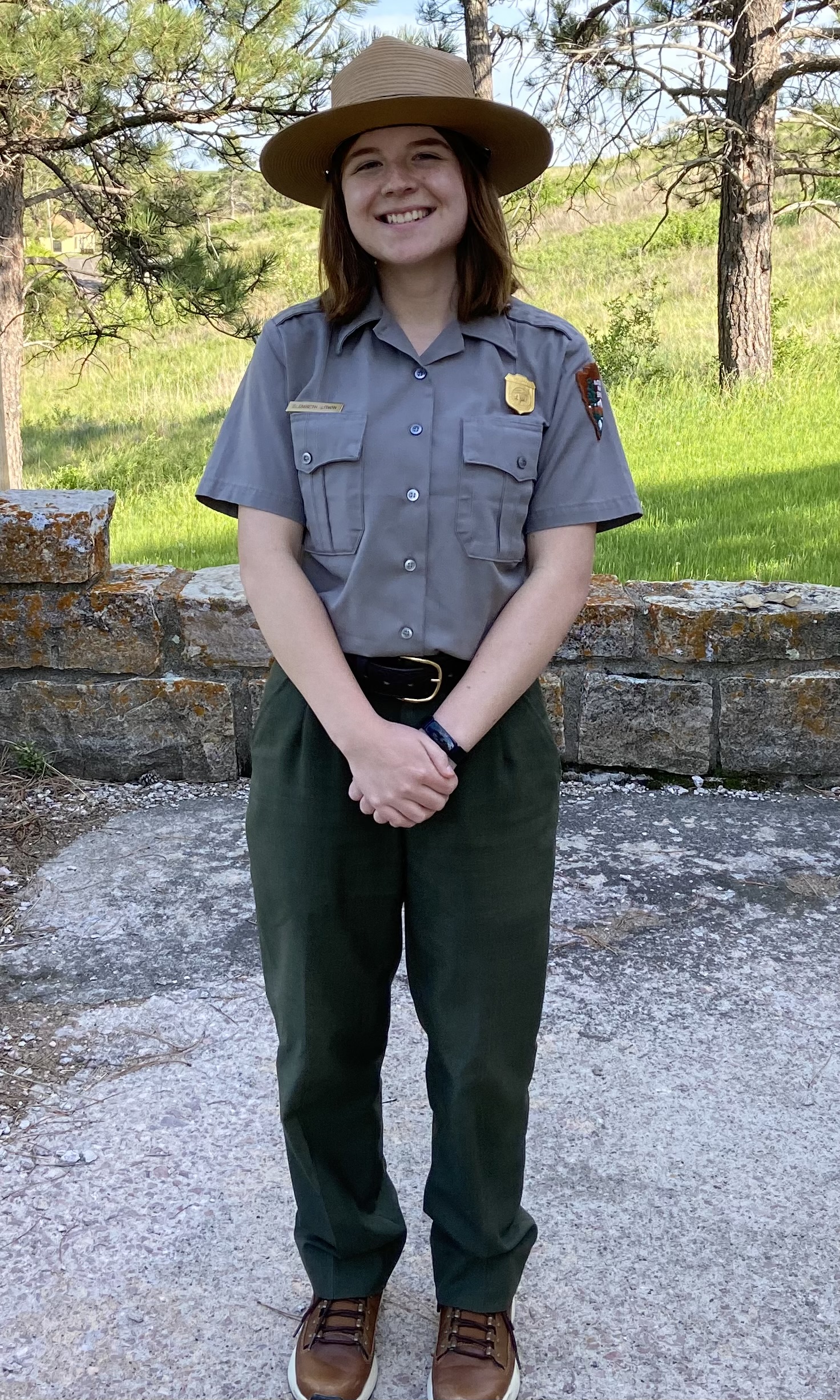MSU Fisheries and Wildlife student and archer is passionate about the stewardship of natural resources
Fisheries and Wildlife senior and member of the MSU Archery Team Elizabeth Litwin dreams to work in the National Park System.

Elizabeth Litwin, a Fisheries and Wildlife senior in the Michigan State University (MSU) Department of Fisheries and Wildlife, exemplifies the student-athlete at Michigan State University and dreams to work in the National Park System. She is one of the 2022 CANR Alumni Association Scholarship recipients.
A member of the MSU Archery Team, Litwin has excelled in academics and has been active in undergraduate research and extracurricular activities.
“I've been on the archery team my entire career at MSU. This is my fourth year as a team member and my first year as team president,” Litwin said. "What I love about the MSU Archery Team is our dedication to the sport while also excelling in academics and professional development. We are completely self-funded and organized, which takes a lot of time and commitment from our members, who have a real passion for archery."
“I have competed in archery for about 10 years. I was introduced to archery through Girl Scouts and continued to practice as member of a Chicago area Junior Olympic Archery Development Team. Throughout high school and college I attended local, state and national tournaments and was lucky enough to become a member of the 2019, 2021 and 2022 U.S. Archery Teams,” she added.
The Fisheries and Wildlife undergraduate program provides a strong base in the foundational and applied sciences of natural resource management. The program is designed to develop an understanding of the cultural, recreational and economic values of biological resources.
“I chose my major at MSU because I am passionate about the stewardship of natural resources, especially on public lands,” Litwin said. “The Fisheries and Wildlife program at MSU has an emphasis on human dimensions, and my career goal is to continue to work with the general public.”
“Studying fisheries and wildlife has applications far beyond fishing and hunting. Responsible management of our natural resources impacts every sector of our society and can be applied to a variety of career paths, which will only become more important as we face the climate crisis.”

This past summer Litwin began to apply the skills she has learned while working as a park ranger at Wind Cave National Park in the Black Hills of South Dakota. It was the first national park established to protect a cave in 1903.
“I found out about this opportunity on the federal hiring website, USA Jobs. I was looking for a seasonal position as a federal park ranger to get my foot in the door working directly for the National Park Service and was extremely excited about the opportunity to give guided cave tours,” she said.
“I love developing interpretation programs and being able to present them to diverse audiences on a daily basis. Connecting visitors directly to the park resources via a tour is very rewarding,” Litwin added.
Last year Litwin worked for the National Park System as an education intern at Channel Islands National Park in California. Her dream job is to work for the National Park System or other agencies within the Department of the Interior. She aspires to create meaningful and accessible programs to connect students and lifelong learners to park resources, as well as integrate current scientific research with cultural history and traditional ecological knowledge.
Name: Elizabeth Litwin
Hometown: Chicago, Ill.
Major/Concentration: Fisheries and Wildlife, B.S., with a concentration in conservation biology
Expected graduation date: May 2023
Why did you choose your major and why MSU?
I chose my major at MSU because I am passionate about the stewardship of natural resources, especially on public lands. The Fisheries and Wildlife program at MSU has an emphasis on human dimensions, and my career goal is to continue to work with the general public.
Who or what inspired your interest in the major you selected?
My freshman year I took a dendrology course (the scientific study of trees) as a fun addition to my schedule. I fell in love with the hands-on outdoor learning experience and collaborating with my classmates. It also helped me better appreciate the nature we experience in our everyday lives on our commute and made me want to contribute my strengths to conservation initiatives.
What has been one of your best experiences within your major so far?
Direct learning of outdoor skills, including electrofishing, recording data and plant identification have been great experiences. They pushed me out of my comfort zone and built my confidence that I am qualified to be a professional in this field.
What do you want others to know about this major?
Studying fisheries and wildlife has applications far beyond fishing and hunting. Responsible management of our natural resources impacts every sector of our society and can be applied to a variety of career paths, which will only become more important as we face the climate crisis.
What are some of the best things about being an MSU student?
The sense of community and variety of extracurricular activities. I’ve been able to continue my passions, such as competitive archery, while also finding new groups to be part of, such as the MSU Bat Association.
Any thoughts or advice for current or new students?
Don’t be afraid to have varied interests. It can be extremely beneficial and rewarding to take courses, attend lectures or join clubs that have no direct correlation to your area of study.
What are your future plans?
My future plans are to continue to work with the National Park Service or other agencies within the Department of the Interior. I hope to create meaningful and accessible programs to connect students and lifelong learners to park resources, as well as integrate current scientific research with cultural history and traditional ecological knowledge.



 Print
Print Email
Email




